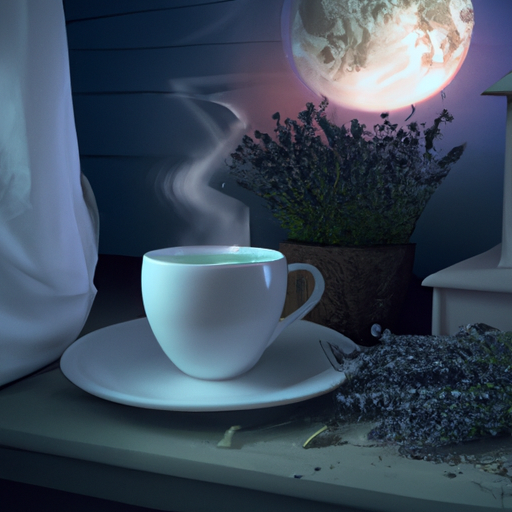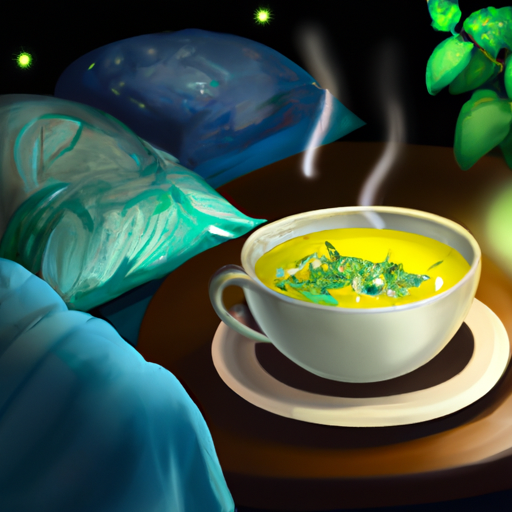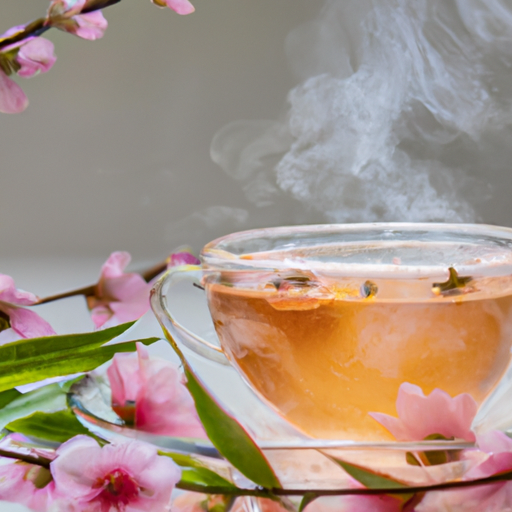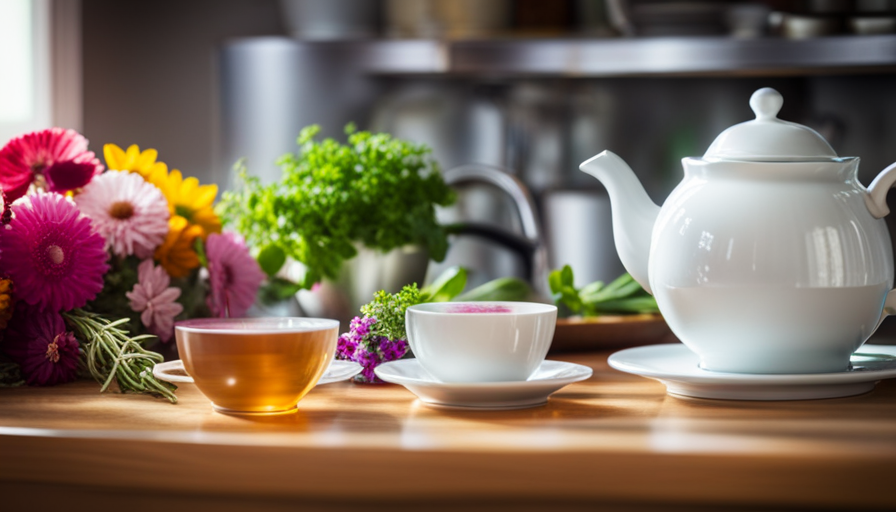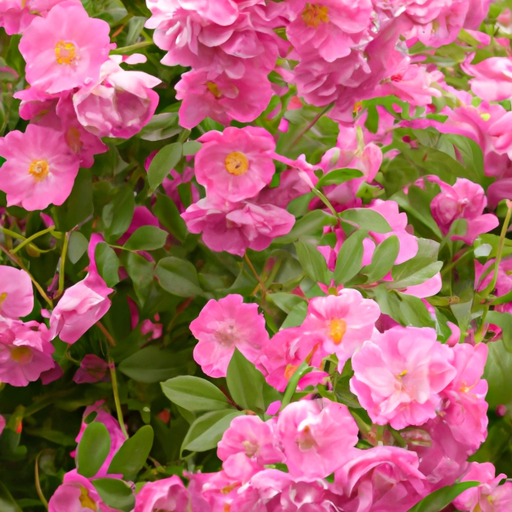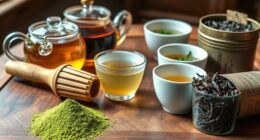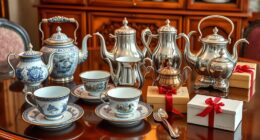Hey there, fellow dreamers! Are you tired of counting sheep and tossing and turning night after night? Well, fret no more, because I’ve got a soothing solution for you.
Picture this: a warm cup of herbal tea, gently lulling you into a peaceful slumber. Sounds like a dream, right? Well, my friend, it’s time to make that dream a reality.
When it comes to finding the perfect herbal tea for a restful night’s sleep, nature has provided us with an abundance of options. From chamomile to lavender, valerian root to peppermint, there’s a tea out there that’s just waiting to whisk you off to dreamland.
But how do you know which one is right for you? Well, fear not, because I’ve done the research for you. In this article, we’ll explore the top herbal teas that have been proven to aid in sleep.
So, grab your favorite mug, cozy up, and get ready to discover the natural wonders that can help you drift off into sweet slumber.
Key Takeaways
- Chamomile tea is a natural sleep aid with calming properties and can improve sleep quality and reduce the time it takes to fall asleep.
- Lavender tea is also beneficial for sleep as it has calming effects and is used as a natural remedy for insomnia, enhancing sleep quality and duration.
- Valerian root tea is a recommended herbal remedy for sleep disorders as it reduces anxiety, promotes tranquility, and improves sleep quality and duration.
- Peppermint tea relaxes muscles, aids digestion, and reduces stress and anxiety, making it a good choice for promoting better sleep.
Chamomile Tea
If you’re looking for a natural remedy to help you drift off to dreamland, chamomile tea is the way to go! Chamomile tea has been used for centuries as a natural sleep aid due to its calming properties. It is made from the dried flowers of the chamomile plant, which contain compounds that promote relaxation and reduce anxiety.
Numerous studies have shown that chamomile tea can improve sleep quality and reduce the time it takes to fall asleep. It works by binding to certain receptors in the brain that help induce sleep and reduce insomnia symptoms. Unlike prescription sleep medications, chamomile tea is non-habit forming and doesn’t have any side effects.
In addition to its sleep-inducing properties, chamomile tea also has other health benefits. It has anti-inflammatory properties, can help with digestion, and may even boost the immune system. It’s a gentle and safe option for those who prefer a natural approach to improving sleep.
Next, let’s explore the benefits of lavender tea for sleep. Lavender tea, like chamomile tea, is known for its calming effects and is often used as a natural remedy for insomnia.
Lavender Tea
When it comes to finding a natural way to calm the mind and relieve stress, I’ve found that lavender tea is a wonderful option. It not only has a delightful aroma, but it also has soothing properties that help me relax after a long day.
Additionally, I’ve noticed that drinking lavender tea before bed enhances my sleep quality and duration. It allows me to wake up feeling refreshed and rejuvenated.
Calms the Mind and Relieves Stress
Chamomile tea, with its gentle and soothing aroma, helps to relax the mind and melt away stress, like a warm hug at the end of a long day. This herbal tea for relaxation has been used for centuries as a natural remedy for insomnia.
The calming properties of chamomile promote a sense of tranquility, making it easier to unwind and prepare for a restful night’s sleep. Chamomile contains compounds like apigenin, which act as natural sedatives, reducing anxiety and promoting relaxation.
Studies have shown that chamomile tea can enhance sleep quality and duration, allowing for a more restorative and rejuvenating slumber. By sipping on a cup of chamomile tea before bedtime, you can create a peaceful bedtime routine that sets the stage for a blissful night of sleep.
Enhances Sleep Quality and Duration
Experience the bliss of a truly restful night’s sleep by indulging in the calming effects of chamomile tea, which effortlessly enhances the quality and duration of your slumber. Chamomile tea is one of the best herbal teas for insomnia, offering a natural remedy for better sleep. Its soothing properties ease tension and anxiety, promoting a state of deep relaxation. This holistic approach to sleep encourages the body to unwind and prepares the mind for a peaceful slumber. Chamomile tea is known for its mild sedative effects, making it an ideal choice for those struggling with sleep disturbances. By incorporating this herbal remedy into your bedtime routine, you can experience the benefits of a rejuvenating and uninterrupted sleep. Transitioning to the next section, let’s explore the power of valerian root tea in promoting a tranquil sleep.
Valerian Root Tea
For a restful night’s sleep, try brewing a cup of Valerian Root Tea – it’ll relax your mind and ease you into a peaceful slumber. Valerian root has been used for centuries as a natural remedy for sleep disorders. Its calming properties help to reduce anxiety and promote a sense of tranquility, making it an excellent choice for those struggling with insomnia or restless nights.
Studies have shown that valerian root can improve sleep quality and duration, allowing you to wake up feeling refreshed and rejuvenated.
When it comes to valerian root tea, the key is finding the right dosage for you. It’s recommended to start with a low dose and gradually increase it if needed. Typically, a dosage of 300-900mg of valerian root extract is considered effective for improving sleep. However, it’s important to consult with a healthcare professional before starting any herbal sleep aid to ensure it’s safe and appropriate for your individual needs.
Transitioning to the next section, if you’re looking for a refreshing and soothing alternative to valerian root tea, consider trying peppermint tea. It offers its own set of unique benefits and can be a delightful addition to your bedtime routine.
Peppermint Tea
If you’re in need of a refreshing and invigorating beverage to wind down before bed, why not give peppermint tea a try? Not only does it have a delightful taste and aroma, but it also offers several benefits that can help promote a better night’s sleep.
Here are three reasons why peppermint tea is a great choice for improving your sleep:
-
It relaxes the muscles: Peppermint tea contains menthol, which has a soothing effect on the muscles. This can help relieve any tension or discomfort that may be keeping you awake at night.
-
It aids digestion: Digestive issues can often disrupt sleep. Peppermint tea has been shown to help relax the muscles of the gastrointestinal tract, reducing symptoms of indigestion and promoting better digestion.
-
It reduces stress and anxiety: The aroma of peppermint tea has a calming effect on the mind and can help reduce stress and anxiety. By sipping on a warm cup of peppermint tea before bed, you can create a relaxing bedtime routine that promotes a peaceful sleep.
To make peppermint tea for better sleep, simply boil water and pour it over fresh or dried peppermint leaves. Let it steep for about 5 minutes, then strain and enjoy.
Now, let’s move on to the next herbal tea that can aid in sleep: lemon balm tea.
Lemon Balm Tea
After exploring the soothing effects of peppermint tea, I was excited to discover another herbal remedy that can aid in a restful night’s sleep: lemon balm tea. This delightful infusion is derived from the leaves of the lemon balm plant, scientifically known as Melissa officinalis.
Lemon balm has been used for centuries due to its numerous health benefits. When it comes to promoting sleep and combating insomnia, lemon balm truly shines. It contains natural compounds that have a calming effect on the mind and body, helping to ease anxiety and promote relaxation. By reducing stress and tension, lemon balm tea can create the perfect environment for a deep and restful sleep.
But the benefits of lemon balm tea go beyond just improving sleep. It has also been found to have antioxidant and anti-inflammatory properties, which can support overall well-being. Additionally, lemon balm has been used traditionally to alleviate digestive issues and improve cognitive function.
With its calming and holistic properties, lemon balm tea is a wonderful natural remedy for those struggling with sleeplessness. However, if you’re looking to explore other herbal options, the next step is to delve into the benefits of passionflower tea. This remarkable herb is renowned for its calming effects on the nervous system, making it another fantastic choice for a good night’s sleep.
Passionflower Tea
Passionflower tea is a wonderful herbal remedy that I’ve personally found to be effective in calming my nervous system and reducing anxiety. It contains compounds that’ve been shown to have a calming effect on the brain, promoting a sense of relaxation and tranquility.
Additionally, passionflower tea has been known to enhance sleep quality and promote restful sleep, making it a great choice for those struggling with insomnia or restless nights.
Calms the Nervous System and Reduces Anxiety
Chamomile tea can help calm my nervous system and reduce anxiety, making it easier for me to fall asleep. Studies show that drinking chamomile tea for two weeks can significantly improve sleep quality.
Chamomile tea is a natural sleep remedy that I incorporate into my calming rituals before bed. Its soothing properties help me unwind and prepare for a restful night’s sleep.
Chamomile tea has been used for centuries as a gentle and effective way to promote relaxation and ease anxiety. By incorporating chamomile tea into my nightly routine, I’m able to create a sense of calm and tranquility that enhances my sleep quality and promotes a more restful sleep.
Enhances Sleep Quality and Promotes Restful Sleep
As we discussed in the previous subtopic, herbal teas can help calm the nervous system and reduce anxiety. But did you know that they can also enhance sleep quality and promote restful sleep? It’s true! Incorporating herbal teas into your bedtime routine can be a natural and effective remedy for insomnia.
Here are four tips for creating a peaceful sleep environment and maximizing the benefits of herbal tea:
-
Establish a consistent bedtime routine to signal to your body that it’s time to wind down.
-
Create a soothing sleep environment by keeping your bedroom cool, dark, and quiet.
-
Limit exposure to electronic devices before bed, as the blue light can disrupt melatonin production.
-
Sip on a warm cup of herbal tea, such as a valerian and chamomile blend, to relax your mind and promote a deep, rejuvenating sleep.
With these natural remedies for insomnia, you’ll be able to enjoy a peaceful night’s sleep and wake up feeling refreshed.
Now, let’s dive into the benefits of valerian and chamomile blend tea.
Valerian and Chamomile Blend Tea
Combining valerian and chamomile creates a soothing blend that aids in promoting a restful night’s sleep. Valerian is a herb that’s been used for centuries to treat insomnia and improve sleep quality. It contains compounds that act as natural sedatives, helping to calm the mind and promote relaxation.
Chamomile, on the other hand, is well-known for its calming properties, reducing anxiety and promoting a sense of well-being.
To make valerian and chamomile tea, simply mix equal parts of dried valerian root and chamomile flowers. Steep one tablespoon of this blend in a cup of hot water for about 10 minutes. You can add honey or lemon for taste if desired. Drink this tea about 30 minutes before bedtime to help prepare your body and mind for sleep.
The valerian and chamomile blend benefits go beyond just improving sleep quality. Research has shown that these herbs can also help reduce insomnia symptoms, such as difficulty falling asleep and staying asleep throughout the night. Additionally, this blend can help alleviate anxiety and stress, promoting a sense of calmness and tranquility.
Overall, the valerian and chamomile blend is a natural and effective way to improve sleep quality and promote restful sleep. By incorporating this soothing tea into your bedtime routine, you can experience the holistic benefits of these herbs and wake up feeling refreshed and rejuvenated.
Frequently Asked Questions
Are there any potential side effects or interactions with medications when consuming herbal teas for sleep aid?
As a holistic wellness advocate, I believe it’s important to consider potential side effects and medication interactions when using herbal teas for sleep aid. It’s always wise to consult with a healthcare professional for personalized advice.
How long should one steep the herbal tea for maximum effectiveness?
For maximum effectiveness, steep herbal tea for 5-10 minutes. Herbal tea promotes relaxation, reduces anxiety, and improves sleep quality. It is a natural and holistic remedy with evidence supporting its benefits as a sleep aid.
Can I combine different herbal teas for an enhanced sleep aid effect?
Combining herbal teas can create bedtime tea blends that enhance sleep aid effects. By carefully selecting and blending calming herbs like chamomile, lavender, and valerian, you can create a holistic and natural solution for a restful night’s sleep.
Are there any specific recommendations for pregnant or breastfeeding women regarding herbal teas for sleep aid?
For pregnant and breastfeeding women, it is important to consult with a healthcare provider before using any herbal tea for sleep aid. Some herbal teas may be safe, such as chamomile or lavender, but it is best to seek professional advice to ensure safety.
Are these herbal teas safe for long-term use, or should they only be used on a temporary basis?
Using herbal teas for sleep aid can be effective on a temporary basis, but long-term safety is important. It’s essential to consider individual needs, consult with a healthcare professional, and explore a holistic approach for sustainable sleep support.
Conclusion
In conclusion, herbal teas can be a natural and effective way to promote better sleep. Research has shown that chamomile tea, with its calming properties, can help reduce anxiety and improve sleep quality.
Additionally, lavender tea has been found to have a relaxing effect, making it a great choice for those struggling with insomnia.
Valerian root tea has also been proven to aid in sleep, with a study showing that 89% of participants experienced improved sleep after drinking it.
So, why not try incorporating these soothing teas into your bedtime routine for a restful night’s sleep?

